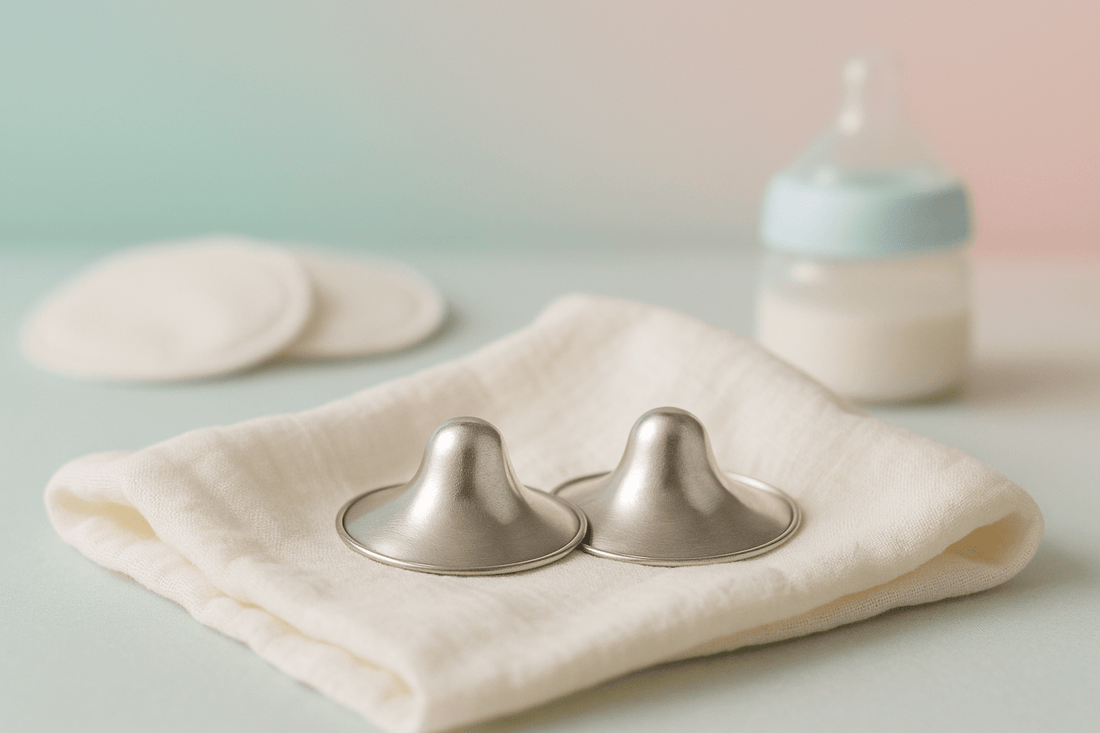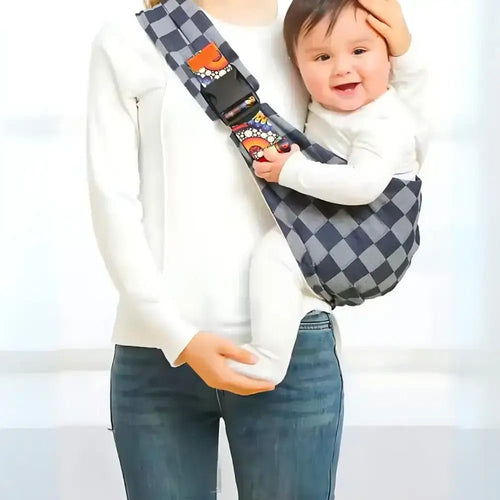
Silverettes FAQ: Essential Guide to Silver Nipple Shields, Nipple Covers for Breastfeeding, and Nursing Cups for New Moms
Breastfeeding can be wonderful, but let's be honest—nipple pain and leaking are super common challenges for new and expectant moms. Silverettes, those little silver nipple shields and breast pads, offer gentle support and a bit of relief when things get tough.
Silverettes can make breastfeeding more comfortable and help keep your nipples happy by reducing pain and managing leaks.

Silverettes work by gently protecting your nipples from friction and irritation. They're easy to use—just pop them inside your bra for ongoing relief.
A lot of moms say silver covers help them heal faster and make breastfeeding feel less overwhelming.
If you want the best results, it's really important to know how to care for and use your silverettes. Clean them regularly and wear them as recommended for the most comfort.
Key Takeaways
- Silverettes help reduce nipple pain and protect against leaking.
- They offer gentle pressure and support for healing nipples.
- Proper care and usage improve breastfeeding comfort.
What Are Silverettes and How Do They Work?
Silverettes are small silver cups that protect sore or cracked nipples during breastfeeding. They combine gentle physical protection with the natural healing power of silver.
Their design supports comfort and helps reduce infection risks.
Composition and Materials

Most Silverettes use 925 sterling silver—that means 92.5% pure silver, with the rest made up of metals like copper for strength. They’re nickel-free, so allergic reactions are rare.
Silver has some pretty amazing antimicrobial and antibacterial properties. It can kill bacteria, fungi, and even some viruses on contact, which helps prevent infections like mastitis and speeds up healing.
Since they're made of real silver, Silverette cups last a long time and are easy to clean. Just wash them with mild soap and water—no need to overthink it.
Anatomical Shape and Design

Silverettes have an anatomical shape that fits comfortably over your nipple and areola. This clever design lets air circulate while protecting you from friction.
Smooth edges mean less irritation. Some models even have silicone or soft padding for extra comfort.
You can place them and remove them without much fuss, so you can use them all day if you want. They cover your nipple but don’t block milk flow, so babies can still latch, and you can use them between feedings to help with soreness.
This little bit of support can really help reduce pain and encourage you to keep going with breastfeeding.
Antimicrobial and Healing Properties

Silver’s natural healing properties work by fighting off the microbes that cause infections and inflammation. Its anti-inflammatory effects can soothe swelling and pain in cracked or sore nipples.
Silverette cups act as a barrier against dirt and bacteria, lowering the chance of infection. The silver ions they release help keep your skin clean and encourage tissue repair.
If you’re dealing with leaking breasts, Silverettes can help there too. They absorb moisture gently, creating a dry environment that helps your skin heal.
Benefits of Using Silverettes for Nursing Mothers
Silverettes offer effective care for moms facing nipple pain, soreness, or cracks. They provide gentle protection and help reduce inflammation.
Prevention and Relief of Nipple Issues

Silverettes help prevent and soothe nipple soreness from frequent nursing. Their lightweight design fits comfortably without adding pressure.
This reduces friction and irritation, which are big causes of cracks and pain. If you have cracked or damaged nipples, you can wear Silverettes between feeds to promote faster healing.
The silver encourages your skin to repair and calms inflammation. Using them regularly can make your nipples feel less raw.
Try to change Silverettes often and always wear them on clean, dry skin. That way, you avoid any buildup that could make things worse.

Protection Against Infection
One of the best things about Silverettes is their natural ability to help reduce infection risk. Silver fights bacteria and germs right on the skin.
Using Silverettes creates a cleaner environment around your nipple, which is especially helpful if the skin is broken or cracked. Keeping things clean means you’re less likely to get painful infections that mess with feeding.
Be sure to clean your Silverettes regularly with mild soap and water. That’s the best way to keep them working and protect your nipple health.
Support for the Breastfeeding Journey
Silverettes support moms dealing with pain or milk leakage. They act like discreet breast pads, catching leaks while letting air in to keep your skin dry.
You can wear them under your clothes all day, which is handy if you’re juggling a lot. They cushion your nipples from clothing and movement, which really helps.
If you’re worried about nipple protection during breaks between feeds, Silverettes create a gentle barrier so you can keep breastfeeding with less discomfort.
Usage and Care Instructions
For more answers about cleaning, combining products, or daily use, visit our FAQ page.
Using Silverettes the right way helps protect your nipples and manage leaking. Taking care of them means they’ll last and stay safe for your skin.
How to Use Silverettes Effectively

Silverettes are easy to use—just slip them inside your nursing bra to protect your nipples. Put them over clean, dry nipples for maximum comfort.
A well-fitting nursing bra keeps them in place, day or night. They’re great for easing soreness from breastfeeding or pumping.
Wear Silverettes only on healthy skin or nipples that are cracked but not severely damaged. For extra comfort, use them with nipple balm or lanolin creams.
Cleaning and Maintenance Tips
Keeping Silverettes clean is super important for your health. After each use, rinse them with warm water and a bit of mild soap.
Skip the harsh detergents—they can damage the metal and irritate your skin. If you notice buildup, soak them for a few minutes in a mix of water and baking soda.
Always dry them completely before putting them back on. Store your Silverettes in a clean, dry case when you’re not using them.
Combining Silverettes With Other Products
Silverettes work great with nursing pads to catch extra milk. They don’t replace pads, but they do add a nice protective barrier for sore nipples.
If you pump often, Silverettes can protect your skin during those sessions too. You might want to apply nipple balm or lanolin after wearing them to prevent dryness.
And honestly, if nipple pain is a big issue, try combining Silverettes with good latch techniques and staying hydrated. They’re safe to use with breastmilk and won’t interfere with feeding.
Expert Insights and Considerations

Silver nipple shields, metal nipple covers, and breast pads can be a lifesaver for moms dealing with soreness and leaking. But you’ve got to know how to use them right to protect your nipples and keep milk flowing.
Guidance From Lactation Consultants
Lactation consultants often suggest silver nipple shields for moms with pain or damage. They protect sore nipples and let milk flow, but you need a good fit to avoid messing with your supply.
Consultants recommend cleaning shields regularly with mild soap and water to keep bacteria at bay. Metal nipple covers can feel cool and soothing on cracked nipples.
Using silver breast pads helps prevent leaks and keeps your skin dry. Change pads often and pick breathable options to avoid infections.
Experts suggest using nipple shields only for short periods and keeping an eye on your baby’s latch.

Understanding Limitations and Safety
Silver nipple shields and metal covers aren’t magic fixes for every breastfeeding problem. They don’t replace solving latch issues or other root causes of pain.
If your baby refuses the shield or your milk supply drops, please reach out to a lactation expert. Safety matters—make sure any silver product you use is free from harmful chemicals.
Watch for signs of infection or pain that gets worse. Silver breast pads help with leaking, but you should still nurse or pump often.
Change your pads regularly to avoid moisture buildup and yeast infections.
| Tip | Reason |
|---|---|
| Clean nipple shields daily | Prevent bacterial growth |
| Use shields temporarily | Maintain natural latch and milk supply |
| Change pads often | Keep breasts dry to avoid irritation |
| Check product materials | Ensure safety and avoid allergic reactions |
Frequently Asked Questions
Taking care of your Silverettes is pretty simple, but it does matter for your comfort and your baby’s health. If you’re new to these little cups, you might wonder how to clean them, when to do it, and whether you can use them with other creams or products.
Let’s walk through some common questions together.
How should Silverettes be cleaned before their first use?
Before you wear Silverettes for the first time, give them a gentle wash with mild soap and warm water. This step helps remove any leftover bits from manufacturing, making sure they’re ready for your skin.
What is the recommended frequency for cleaning Silverettes?
Try to wash your Silverettes once a day after you use them. Just use mild soap and water—nothing fancy.
This keeps oils and bacteria from building up, which can help you avoid irritation or infection.
Can Silverettes be used in conjunction with lanolin?
Absolutely, you can use lanolin with Silverettes. Lanolin soothes sore nipples, and pairing it with Silverettes won’t take away any of the cups’ protective benefits.
Lots of moms find this combo extra comforting, especially in those early weeks.
Are Silverettes considered safe for infants during breastfeeding?
Yes, Silverettes are safe to wear while breastfeeding your baby. They let milk flow as usual and protect your nipples at the same time.
Just double-check that they fit well and don’t cause any pinching or discomfort. If something feels off, don’t hesitate to adjust or ask for help.
What is the mechanism behind the effectiveness of Silverettes?
Silverettes work by forming a gentle barrier that shields your nipples from friction and moisture. The silver itself has natural antibacterial properties, which can lower your risk of infection.
It’s a small thing, but it can make a big difference when you’re breastfeeding and just want a little extra comfort.
Is it necessary to wash nipples after using Silverettes?
It's usually a good idea to gently wash your nipples with water after you take off Silverettes. This simple step helps keep your skin clean and can prevent irritation from sweat or leftover milk.
If you're in a rush or just too tired (which, let's be honest, happens a lot), even a quick rinse can make a difference. Just avoid using harsh soaps—plain water is usually enough for most moms.
Still have more questions? You can find answers to many common topics on our full FAQ page.


